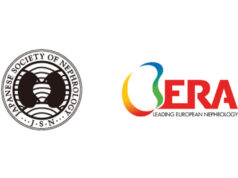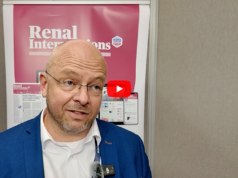At this year’s UK Kidney Association (UKKA) UK Kidney Week (UKKW) meeting (11–13 June, Edinburgh, UK), Renal Interventions spoke with the outgoing president of the UKKA, Paul Cockwell (University Hospitals Birmingham, Birmingham, UK) about his thoughts on the highlights of the meeting and what can be expected from the UKKA in the upcoming year.
What are some of the highlights of UKKW 2024?
There are multiple highlights. A thing that really captures me is the energy and the sheer quality that we see with a lot of the poster sessions, where you’ve got small groups of engaged people who are focussed on areas of interest to them, with really high-quality presentations by colleagues from across the UK. We have a multi-professional medical team that have been working so hard to put together evidence that lifts us to be able to provide better care for patients with kidney disease. The other thing that has really stood out for me—we’re now halfway through the second day—is the quality of the plenary sessions, which have been inspiring, both in the way that the speakers have presented their background, but also in the way that they challenge some of the paradigms as how we think about risk and how we think about how we talk to people with kidney disease. A real standout this morning was the presentation of the first lifetime achievement award from the UKKA, which was given to Dwomoa Adu (University of Ghana Medical School, Accra, Ghana), who has had a career of contributing to, developing, mentoring, supporting, and providing evidence. He spoke about the recent part of his journey, which is an inspiring story of defining the genetics of apolipoprotein L1 (APOL1) in people of Sub-Saharan Africa and really adding to what we know about that particular area.
What are some UKKA projects to look out for in the upcoming year?
Despite the fact that we’re in an incredibly exciting time in terms of the development of therapies and new options for people with kidney disease, the real focus for us now as an association has to be on how we get key messaging around the inequalities of care for people with kidney disease. There are some real signals, not just in the UK, but internationally, that access to treatments is a challenge, and that gap is widening. So, if you are of a lower economic status, or if you’re in a certain demographic or ethnic group, then you’re less likely to have access to care, and if your kidney disease is more advanced, you’re less likely to be offered disease-modifying treatments. So how do we really work in our systems to ensure that each area is supported properly to make the case for what they need, in terms of resources, leadership, and for care pathways for people in each of their systems, in each of their localities? That for us is a huge challenge. We spent a good deal of time as a leadership team talking about how we really frame that for the membership, and for the broader community as well. I think that a lot of the work that we’re going to be doing over the next year or so in terms of policy isn’t going to be about advocating at a political level, but actually advocating for each system, so that we get some accountability for how integrated care boards and how broader health leadership systems in devolved nations are held accountable for helping to provide high-quality care for people with kidney disease.











